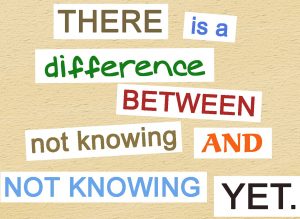 So, here I am, again, with tears dripping from my chin. Not from sadness, although there is sadness there. Not from happiness, not from grief, although there is grief there.
So, here I am, again, with tears dripping from my chin. Not from sadness, although there is sadness there. Not from happiness, not from grief, although there is grief there.
I have been watching videos of TED talks, all grouped, themed, around practice. Around getting better at something.
All are great, but the one by Carol Dweck 1 and her findings is when I started to cry.
I may be smart, I may be an empath, but I am no educational scientist, even though I teach. And I struggle… struggle with what I call TLB and what she calls yes/no mindset, or “now” mindset.
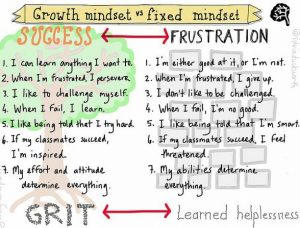 The now mindset is where you have to get it right “now”… or else.
The now mindset is where you have to get it right “now”… or else.
Schools operate that way. Parents operate that way. Most workplaces operate that way.
Result: the population is getting dumber.
On the other extreme is the “not yet” mindset, where growth is normal.
I have a “not yet” mindset, and I always have. I didn’t have growth techniques, so I never got really good at anything, but the mindset, that I had.
It is one of the 160 capacities that humans have already programmed in their DNA, it just needs to be activated.
When you face a task with that “not yet” mindset, you are OK with what you see, you are OK with what you are capable to glean from it.
And that does one thing only: it makes you keep looking, without wanting to quit, without beating yourself up, without thinking that where you are today is significant.
When you climb a mountain, when you look up you see that you are “not yet” on the top. And when you look down, you see how far you have come.
You don’t (I hope) beat yourself up and go back down, or camp out where you are.
But in life: that is exactly what your “now” mindset is telling you to do.
I have never had a “not yet” mindset person come to me to be taught. I have had people who have had periods in their lives when they pushed through “not yet” successfully, but it wasn’t everywhere in their lives.
Reading is one of the activities I demand from my students.
Reading is hard for most people, if they have a “now” mindset. Staying with the book, comprehending, getting it is near impossible with a “now” mindset. Why? because every time your attention wonders, every time you have a word you don’t quite know what it means, you get sent to the bottom of the mountain.
A horrible experience.
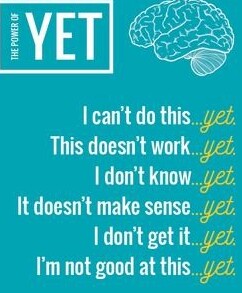 I had to do a lot of self-observation to find the right words to say to the students about reading.
I had to do a lot of self-observation to find the right words to say to the students about reading.
Mastering reading,
- first for the mechanics of it,
- then make it regular,
- then catch what you catch but don’t try,
- then catch more,
- then engage,
- then reflect… these are stages that often take weeks each.
The end result: a person has one new area in their life where they are not a complete failure. This is significant. Because just the way one bad apple can spoil a whole batch, one area where you are good can carry over to other areas.
Because I teach through the 67 audios of the 67 steps program, the next area is the steps. Same process: listen, and start mastering the mechanics. Don’t worry if you can grasp anything. Not important yet. Just get into the habit and the mechanics of it… of not multitasking, or not going to lala land, but gently noticing and returning to listening.
This may take months! For someone whose life is full of distractions, this is a big big big mountain to climb. But I have never had anyone who could not climb it.
Only when the mechanics and the habit are cemented, meaning they go well… that you want to start paying attention to what you are getting, a little bit here and a little bit there.
I am on my 6th round, I think, and I am still not ready to answer Tai’s questions at the end of the steps. But I am getting a lot out of listening… because I have graduated to the reflecting while listening stage.
Whatever I was reflecting on, I find it in my daily work manifested… Without trying to.
All those books, all those TED talks talk about the principles, talk about practicing to get better in a non-performance environment, but they actually don’t teach it how to do.
So myself, as a teacher, I will have to get guidance where I can find it.
I am an authoritarian teacher. Not a perfect match for “not yet” mindset.
In the years I have gotten better, but now that I have a focus of practice, a focus of improvement, I can adapt practices by people who are good at it, Beyonce, it seems, and Michael Jordan.
They watched videos of their performance, and found the “what’s missing”, or “what can be done better” nuances.
And then they implemented those changes.
I can re-listen my classes and do the same.
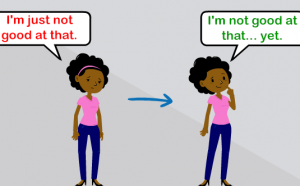 There is nothing more important to me than changing your mindset from “now” to “not yet”.
There is nothing more important to me than changing your mindset from “now” to “not yet”.
Not yet is the mindset where you can get smarter, where you can grow.
And growth is my promise to you.
On the Tree of Life growth is natural… Life is all about growth.
As long as you are stuck on the Tree of Knowledge you can’t grow as a person. And you can’t raise your vibration.
Since I have read the books on deliberate practice, Peak by Anders Ericsson, and Grit by Angela Duckworth, I have raised my IQ by a lot, and I got a whole lot better at a lot of things I do daily.
There are still a lot of things where I allow the chips fall where the chips fall… i.e. I don’t have a system, I don’t improve.
My physical activities are a good example for that.
So in addition to bringing deliberate practice to my teaching so you don’t feel threatened by my displeasure 🙁
I am going to bring deliberate practice to my walking.
Maybe I’ll have less pain? Maybe I’ll enjoy it more? Maybe I’ll find out that my sloppy walking is what is damaging my body?
Whatever I’ll find out is what I’ll work on… one thing at a time. That is the essence of deliberate practice. Gradual improvements of where you are weak, or bad… lol.
 The title talks about your TLB. Not accidentally the same capacity that operates or lacks in TLB, the Twitchy Little Bastard score, the Marshmallow Eater, is the same as what lacks in the “now” mindset of a person who can’t learn, can’t grow…
The title talks about your TLB. Not accidentally the same capacity that operates or lacks in TLB, the Twitchy Little Bastard score, the Marshmallow Eater, is the same as what lacks in the “now” mindset of a person who can’t learn, can’t grow…
The inability and the unwillingness to experience oneself “not yet” praiseworthy, not yet deserving, not yet good enough.
That is the core issue, and that is what you want to attack with all your might.
So you can truly become all you can be.
Want to know your TLB score? I bet you already know… but you can ask me to measure it for you.
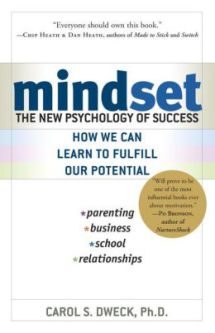 Carol Dweck Stanford Psychology Professor researches “growth mindset” — the idea that we can grow our brain’s capacity to learn and to solve problems. In this talk, she describes two ways to think about a problem that’s slightly too hard for you to solve. Are you not smart enough to solve it … or have you just not solved it yet? A great introduction to this influential field.
Carol Dweck Stanford Psychology Professor researches “growth mindset” — the idea that we can grow our brain’s capacity to learn and to solve problems. In this talk, she describes two ways to think about a problem that’s slightly too hard for you to solve. Are you not smart enough to solve it … or have you just not solved it yet? A great introduction to this influential field.
